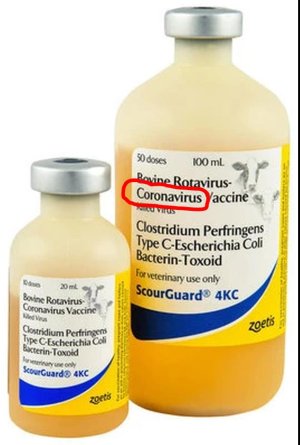Uh... yeah, they've been around a long time. Canine coronavirus vaccine has been around since the '80s, too.
I was using on my own, and client herds, Calf-Guard oral live attenuated rota/corona virus vaccine in baby calves and ScourGuard in the cows... as far back as 1985, and they weren't 'new' even then.
I've not looked at the label recommendations on the bottle of ScourGuard in years, but investigations into immune responses in more recent times... like the last decade... suggest that colostral antibody levels are 'set' by 5 weeks pre-calving - vaccines given later than that are probably not going to have optimum effect.
So... in order to maximize colostral antibody production, it would be advisable to give doses of rota/corona virus vaccines and/or annual boosters of anything you want antibodies against in colostrum at least 8 weeks pre-calving to ensure maximum IgA levels at calving.
One other thing to know about those anti-rota/corona antibodies... the ones absorbed from colostrum do not provide protection against rota/coronavirus scours - you need antibodies present in the stomach/gut lumen to fight infection.
Studies done back in the 1980s showed that vaccinated heifers were still secreting detectible levels of anti-rota/corona antibodies (IgA) in their milk at least 28 days post-calving (that's probably as far out as they bothered to check) ... essentially providing an 'antiseptic paint', if you will, to contact and inactivate those viruses the calf might come in contact with from the environment.
As an aside, I posed the question to one of my virology professors... back around 1986... if secretory antibodies (IgA) at the mucosal surface of the gut are what we're going for when we vaccinate baby calves with a live oral rota/corona vaccine... would colostral and milk IgA levels be increased if we gave the COWS a dose of the oral rota/corona vaccine, instead of injecting it? He didn't have an answer, but said (maybe he was just being kind) that it was a reasonable question. No one has done that study, so far as I'm aware. I only had a handful of beef cows at the time, and I did give them all a dose of CalfGuard, orally, prior to calving, as I'd had a run of coronavirus scours in dairy calves we were raising.

